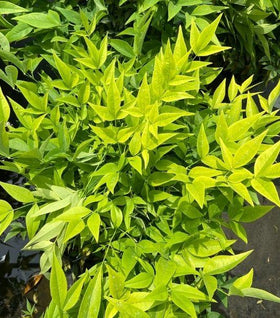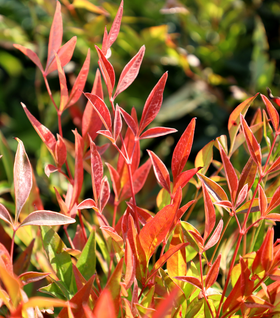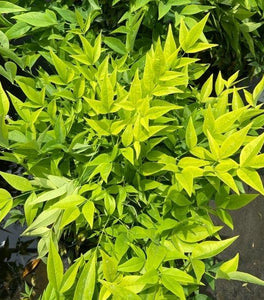Images Depict Mature Plants
Cool Glow™ Lime Nandina Shrubs for Sale Online
The new Cool Glow™ Nandinas from First Editions are the perfect additions to the Nandina domestica family. Cool Glow™ Lime will glow against a wintery backdrop with its brilliant lime-green foliage in fall and winter. This bright, compact landscaping shrub will look stunning all year round.
Plant as a specimen plant in smaller garden designs or as a foundation in mass planting projects for a splash of vibrant light green in the cooler seasons. This plant is a deer-resistant and drought-tolerant shrub, making it a versatile choice for landscapers and gardeners alike.
| Hardiness Zone: | 6-9 |
|---|---|
| Mature Height: | 3 to 4 Feet |
| Mature width: | 3 to 4 Feet |
| Classification: | Broad leaved evergreen shrub |
| sunlight: | Full sun to part shade |
| habit: | Upright, rounded |
| Foliage: | Dark green lacy foliage turns bright lemon-lime green in fall |
| Flower Color: | White |
| Pruning season: | Prune in late winter if at all |
| Soil condition: | Any well drained soil |
| Water Requirements: | Water well until established |
| Uses: | Ornamental, mixed borders, containers, specimen, or mass planting |

How to Care for First Editions® Cool Glow® Lime Nandina
Before you buy your Cool Glow Lime Nandina Shrub, make sure to read about the recommended care instructions to keep this plant healthy and thriving.
How do I plant a Cool Glow Lime Nandina Domestica?
To start, dig a hole twice as wide and the same depth as the root ball of your new Cool Glow Lime Nandina. Next, amend the soil at the bottom of the hole with a 50/50 mix of native soil and organic matter, such as peat or compost. Now is the perfect time to add a starting fertilizer, such as Espoma Biotone Starter Plus. Next, position your plant so that the top of the original soil will still be visible before mulch. Backfill the hole by adding more of the amended 50/50 soil underneath the root ball of the Nandina until it stays in the desired position. Pat gently, add a few inches of mulch over the soil, and water thoroughly.
When is the best time to fertilize Nandina shrubs?
Nandina domestica, or heavenly bamboo, do well when fertilized once in the spring and again in the early summer, as this is when the plant needs nutrients to promote growth. Don't fertilize nandinas after August if you live in more northern zones; this will inhibit your plant's ability to transition into a healthy dormancy in the fall. The Cool Glow Lime Nandina is technically an evergreen shrub and will retain its bright green fall foliage. Your shrub will enter a dormancy stage, and this is why it is best to fertilize in spring and early summer only. Any well-balanced, slow-release fertilizer will do, such as Espoma Plant-tone.
How much water does my Cool Glow Lime Nandina Shrub need?
Cool Glow Lime Nandina is deer, disease, and drought-resistant, making them an excellent choice for many landscapes. When first planting your Cool Glow Lime Nandina, you will want to give it plenty of water so that the roots have everything they need to become well established in the soil. Watering to a count of 5 for each gallon-size will help make sure you water just the right amount. (Count to 5 for a 1 Gallon pot, 10 for a 2 Gallon pot, 15 for a 3 Gallon pot, etc.). Depending on the soil drainage you have, you will need to keep an eye on your nandinas for the first few weeks to see how often you need to water so that they stay moist but not drenched. Typically you will water new bushes every few days, at least twice a week. Once they are established, they can handle brief periods between waterings when the soil is drier. When in doubt, it is better to wait between waterings than to overwater; to prevent root rot.

How much sunlight do Cool Glow Lime Nandinas need?
Nandina shrubs, including the Cool Glow Lime Nandina, are beloved for their lacy foliage, bright fall colors, and hardiness in a wide range of sunlight conditions. Nandinas will do just fine in the shade because of their hardiness. However, they will not show off the beautiful glowing colors while sitting in shady corners. To get the best range of color from your plants, make sure they are getting at least 6 to 8 hours of sunlight and more in cooler climates.















